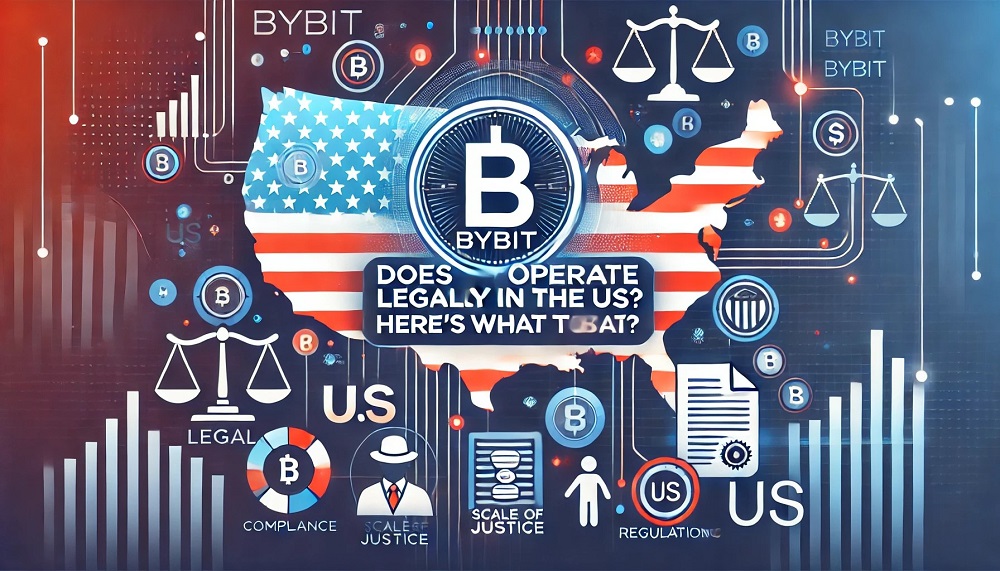Renowned crypto exchange ByBit has become popular worldwide because of its strong trading capabilities and easy-to-use design. ByBit’s legality is crucial for US crypto traders, as they must adhere strictly to federal and state-level regulations to ensure users’ safe trading.
This guide provides insights into Bybit’s legal situation in the US, the regulatory environment, and the risks involved with using the platform.
ByBit and Federal Regulatory Landscape
Under the control of the Securities and Exchange Commission (SEC) and the Commodity Futures Trading Commission (CFTC), the United States has a strict legislative framework for crypto exchanges. By enforcing rigorous compliance criteria on financial platforms, these organizations hope to safeguard investors and preserve market integrity.
However, at the time of writing, Bybit had not received the required clearance from these federal authorities. Thus, it cannot lawfully operate in the US. The SEC and CFTC have strict rules. Hence, non-compliance could lead to hefty fines and prohibitions on financial transactions involving US individuals.
State Level Regulations
State laws are also important in addition to federal rules. For instance, New York’s BitLicense mandates that companies in the crypto industry obtain a license to operate, adding another level of compliance difficulty.
States such as Texas and California have their laws, which results in a very scattered regulatory scene. Conversely, States like Wyoming have embraced more crypto-friendly laws to attract blockchain companies.
Wyoming introduced the Special Purpose Depository Institution (SPDI) charter, which provides a more suitable setting for crypto exchanges. However, despite these lax state-level rules, Bybit still has operational difficulties in the US.
Bypassing Restrictions: Risks and Repercussions
Some US users try to hide their IP addresses by accessing ByBit over VPNs. Although this would allow them access to the exchange, there are significant risks involved.
The explicit terms of service of ByBit forbid using VPNs to circumvent geographical restrictions. Any identified infractions could result in account suspension or a permanent ban, including permanent loss of access to funds in the account.
Moreover, breaking restrictions by using a VPN can put users in legal hot water. The US government is more alert than ever about enforcing crypto rules. So, breaking them could land users with fines or other regulatory punishments. Thus, users must consider these concerns before trying to access ByBit via VPNs.
Alternative Platforms for American Users
Considering the legal difficulties surrounding ByBit, US citizens should look at other crypto exchanges that comply with local regulations.
Kraken
Popular among US traders for its security and array of supported cryptocurrencies, Kraken is suitable for novice and professional traders. It offers minimal transaction costs and sophisticated trading tools.
Gemini
Gemini appeals to cautious traders with its insurance coverage for digital assets and emphasis on security and regulatory compliance.
Decentralized Exchange (DEX) Options
DEXs are decent options over conventional platforms and are ideal for those looking for more control over their assets. DEXs allow customers to trade directly from their wallets and function without a central authority.
Uniswap and SushiSwap
Both platforms allow users to trade a variety of tokens straight from their Ethereum wallets. However, SushiSwap offers extra tools like staking and yield farming.
PancakeSwap
Popular DEX choice PancakeSwap operates on the Binance Smart Chain and offers minimal transaction fees and a wide range of trade pairs.
Ensuring Security and Compliance
Compliance and security should be your first concerns while trading on crypto platforms. For optimal security, you must ensure every account has strong, distinctive passwords and activate two-factor authentication (2FA).
Also, follow credible sites and crypto industry professionals to stay informed about regulatory changes and sector advancements. Similarly, knowing the legal situation of crypto exchanges in your country and following local regulations can help you avoid legal hot waters.
ByBit and Global Compliance Efforts
Bybit has made notable attempts to follow the rules in other countries. Originally based in Singapore, ByBit relocated its activities to Dubai in line with its dedication to running legal business operations.
The platform follows strict anti-money laundering (AML) policies and has the required licenses. Strong KYC processes verify user identity, lowering the danger of fraudulent behavior and improving general security.
To Sum Up
Strict federal and state regulations mean that ByBit is not legally accessible to US citizens. Although some users might try to circumvent these limits by using VPNs, this strategy comes with severe dangers, like account termination, fund loss, and legal repercussions.
US citizens should explore other crypto exchanges that follow local rules, such as Gemini and Kraken. If you’re seeking more asset control, try decentralized exchanges such as Uniswap, SushiSwap, and PancakeSwap, which are also reasonable ByBit substitutes.
